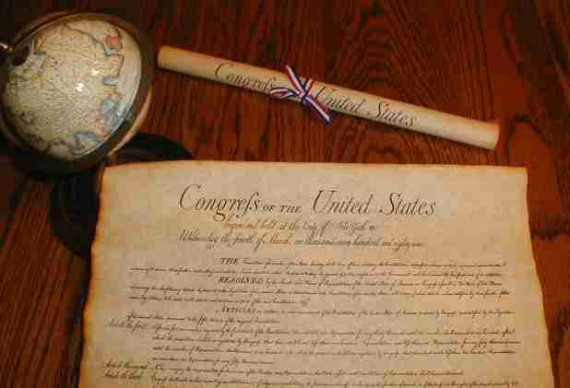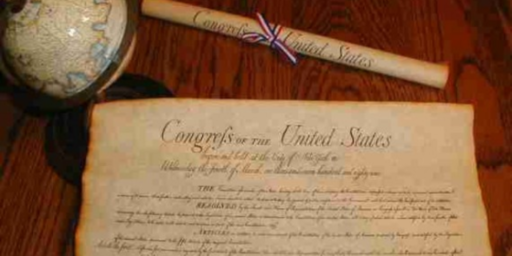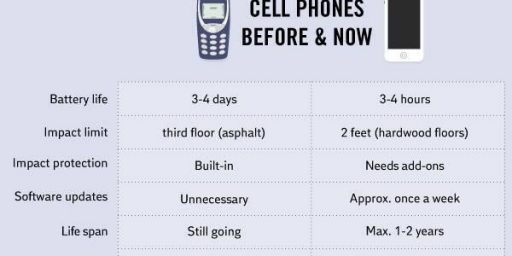New Jersey Supreme Court: Warrant Required To Track Via Cell Phone GPS
New Jersey's highest court gets it right.
Entering territory that only a few Federal Courts have had the opportunity to rule on as of yet, the New Jersey Supreme Court has ruled that police must have a search warrant in order to obtain the data necessary to use a phone’s GPS features to track its owner:
Staking out new ground in the noisy debate about technology and privacy in law enforcement, the New Jersey Supreme Court on Thursday ordered that the police will now have to get a search warrant before obtaining tracking information from cellphone providers.
The ruling puts the state at the forefront of efforts to define the boundaries around a law enforcement practice that a national survey last year showed was routine, and typically done without court oversight or public awareness. With lower courts divided on the use of cellphone tracking data, legal experts say, the issue is likely to end up before the United States Supreme Court.
The New Jersey decision also underscores the extent of the battles over government intrusion into personal data in a quickly advancing digital age, from small town police departments to the National Security Agency’s surveillance of e-mail and cellphone conversations.
Several states and Congress are considering legislation to require that warrants based on probable cause be obtained before investigators can get cellphone data. Montana recently became the first state to pass such a measure into law. The California Legislature approved a similar bill in 2012, but Gov. Jerry Brown vetoed it, saying it did not “strike the right balance” between the needs of law enforcement and the rights of citizens.
The Florida Supreme Court ruled in May that the police could seize a cellphone without a warrant, but needed a warrant to search it. And a case before the United States Court of Appeals for the Fourth Circuit, in Richmond, Va., is weighing whether investigators acted legally when they got a court order, but not a warrant, to obtain 221 days of cellphone location data for suspects in an armed robbery case in Maryland.
“This type of issue will play out in many jurisdictions for the simple reason that cellphones are so prevalent in daily life,” said Peter G. Verniero, a former New Jersey attorney general and State Supreme Court justice. “The decision affects just about everybody.”
“Law enforcement is trying to keep up with technology, as well they should,” he added. “It’s very legitimate for law enforcement to use technology, but this court decision is a strong reminder that constitutional standards still apply. The courts have to adapt, and law enforcement has to adapt.”
The only case similar to this that has reached a higher Court is a case decided last year by the Supreme Court dealing with the issue of police officers planting an independent GPS locator device on a suspect’s vehicle for the purpose of tracking the vehicles location. At issue in that case was the question of whether or not law enforcement should have been required to obtain a warrant based on probable cause prior to planting the device on the car. Previously, the Court of Appeals from which the case had originated had ruled in a broad ruling that placing the device on the vehicle without a warrant was per se unconstitutional. In another case originating out of the 9th Circuit that did not make it to the Supreme Court, Judge Alex Kozinski took a similar position in dissent. The Supreme Court, though, didn’t go that far last year, instead ruling in a divided case with no clear ruling only that the act of placing the GPS tracker on the car is a “search” for Fourth Amendment purposes without specifically ruling on whether a warrant is required in each case.
Despite the fact that this Supreme Court ruling was far from clear on the specifics of what the Fourth Amendment required, the New Jersey Justices did rely on it in part in making their decision:
The ruling involved a case that began with a string of burglaries in homes in Middletown, N.J. A court ordered the tracing of a cellphone that had been stolen from one home, which led to a man in a bar in nearby Asbury Park, who said his cousin had sold him the phone, and had been involved in burglaries. The police then used data they got from T-Mobile to locate the suspect, Thomas W. Earls, at three points on a subsequent evening, tracking him to a motel room where he was found with a television and suitcases full of stolen goods.
In a unanimous decision, the State Supreme Court said that when people entered cellphone contracts, “they can reasonably expect that their personal information will remain private.”
The justices recognized that this departed somewhat from federal case law. But they relied in part on a United States Supreme Court decision last year that the police could not attach a Global Positioning System to a suspect’s car without a warrant. A cellphone, the New Jersey justices said, was like a GPS device.
“Using a cellphone to determine the location of its owner can be far more revealing than acquiring toll billing, bank, or Internet subscriber records,” said the opinion, written by Chief Justice Stuart Rabner. “Details about the location of a cellphone can provide an intimate picture of one’s daily life and reveal not just where people go — which doctors, religious services and stores they visit — but also the people and groups they choose to affiliate with. That information cuts across a broad range of personal ties with family, friends, political groups, health care providers and others.”
Besides establishing a firmer legal bar for the police to obtain cellphone data, the Supreme Court also remanded the case to the appeals court to determine whether the evidence collected using the cellphone records could be admitted in court under an “emergency aid exception” to the requirement for a warrant.
Here’s how the Court put the ultimate holding:
As a general rule, the more sophisticated and precise the tracking, the greater the privacy concern. The question before the Court, then, is informed by changes in technology, because they affect the level of detail that telephone companies can relay to law enforcement. To be sure, the degree of information available through cell-phone tracking has grown with each passing year. As discussed above, in 2006, cell phones could be tracked to within a one-mile radius or less of the nearest cell tower. Today, that distance has narrowed to the point that cell phones can be pinpointed with great precision — to within feet in some instances. That information is updated every seven seconds through interactions with cell towers, whether the phone is in public or private space. As noted, that continuous process can reveal a great deal of private information about a person’s life.
Viewed from the perspective of a reasonable expectation of privacy, what was problematic in 2006 is plainly invasive today. We are not able to draw a fine line across that spectrum and calculate a person’s legitimate expectation of privacy with mathematical certainty — noting each slight forward advance in technology. Courts are not adept at that task. Instead, our focus belongs on the obvious: cell phones are not meant to serve as tracking devices to locate their owners wherever they may be. People buy cell phones to communicate with others, to use the Internet, and for a growing number of other reasons. But no one buys a cell phone to share detailed information about their whereabouts with the police. That was true in 2006 and is equally true today. Citizens have a legitimate privacy interest in such information. Although individuals may be generally aware that their phones can be tracked, most people do not realize the extent of modern tracking capabilities and reasonably do not expect law enforcement to convert their phones into precise, possibly continuous tracking tools.
For the reasons discussed, we conclude that Article I, Paragraph 7 of the New Jersey Constitution protects an individual’s privacy interest in the location of his or her cell phone. Users are reasonably entitled to expect confidentiality in the ever-increasing level of detail that cell phones can reveal about their lives. Because of the nature of the intrusion, and the corresponding, legitimate privacy interest at stake, we hold today that police must obtain a warrant based on a showing of probable cause, or qualify for an exception to the warrant requirement, to obtain tracking information through the use of a cell phone.
By providing greater clarity to the law in this area, we strive to meet two aims: to protect the reasonable expectation of privacy that cell-phone users have and, at the same time, to offer clear guidance to law enforcement officials so they may carry out important tasks in the interest of public safety. Both the public and the police will be better served by a clear set of rules. To be sure, law enforcement officials will still be able to turn to cell-phone providers to obtain location information, as long as such requests are accompanied by a warrant issued by a neutral magistrate and supported by probable cause. We emphasize that no warrant is required in emergency situations or when some other exception to the warrant requirement applies
Like many states, the New Jersey Supreme Court has in the past interpreted that state’s version of the Fourth Amendment to be broader in its protections than the protection granted by the Fourth Amendment to the United States Constitution, so the ruling here is not necessarily applicable nationwide. However, the manner in which the New Jersey Court applies the general principles of search and seizure law in this case should be a guide for Courts elsewhere as these cases become more common, as they inevitably will.
Take, for example, the question of what police can do with a cell phone found on the person of someone they’ve taken into custody. Should they be free to search the contents of that phone at will, meaning everything from seeing who is in a person’s contacts list, to who they’ve been calling and texting, to what they’ve been accessing on the Internet. As noted in the quoted text above, in 2011, California Governor Jerry Brown vetoed a bill that would have required police to get a search warrant every time they wanted to search someone’s phone on the grounds that it would have placed too big a burden on law enforcement. This leaves it to the Courts to try to hammer out the rules that will govern such searches, a situation that is, as I noted at the time less than ideal. Ideal or not, though, it will likely be up to the Courts to decide issues like this more and more in the years to come. Here’s hoping that they find the Garden State Justice’s reasoning persuasive enough to adopt on a nationwide basis.
Here’s the opinion:






Excellent. Next up: Congress mandates VPNs for all citizens in direct support of their rights to privacy, which did not vanish upon our entry to the digital age. Any elected official who claims otherwise is ripe for removal from office.
Wait a minute: Unless I’m misunderstanding the facts, police were tracking A STOLEN CELLPHONE, not that of the rightful owner? That strikes me as a wholly different matter. Surely, one has no expectation of privacy vis-a-vis the location of stolen property?
Well, assuming that the author of the Original Post is also responsible for the headline, I will give vent to my cormudgenly self and point out that one of the lengthy cut-and-paste bits here contradicts the headline.
“…in 2006, cell phones could be tracked to within a one-mile radius or less of the nearest cell tower. Today, that distance has narrowed to the point that cell phones can be pinpointed with great precision — to within feet in some instances. That information is updated every seven seconds through interactions with cell towers….”
GPS has absolutely nothing to do with it. Do you even read what you put here?
@James Joyner:
Yes, you misunderstood the facts. The initial trace was for a stolen cellphone. After the police tracked it down, that person gave them the name of the person who sold it to him. The police then tracked that person’s personal cellphone to find his location.
@James: Ah, okay.